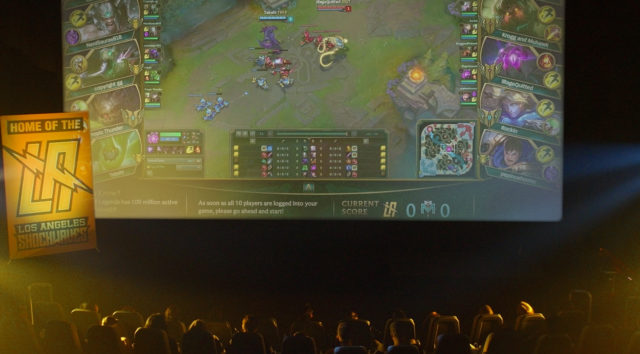Super League Gaming is adding Riot Games’ League of Legends to its national network of movie theater video game competition. The startup will continue to offer team-based Minecraft leagues, which are entering their fifth season. But it’s adding two new ways for amateur and everyday gamers to experience League of Legends within a structured environment in select Cinemark and other movie theaters across the country.
“We’ve always had a strategy to expand into other genres of games and to start to create larger gaming communities with different levels of play,” Ann Hand, CEO of Super League Gaming, told [a]listdaily.
Super League began conversations with Riot Games last year, after which they attended several in-theater events.

“They like the notion of bringing their community into theaters, and at the same time providing something the community wanted with a more competitive league structure,” Hand said. “It’s like a mini LCS (League Championship Series) in theaters. It also provides an opportunity for more casual players to make more friends (in person) to play with online.”
Super League is introducing its City Champs five-week league structure this year with four inaugural teams: Los Angeles Shockwaves, Miami Menace, Chicago Force and Dallas Dynamite. Hand said by next fall that number will grow to 20 cities. She expects to have as many as 12 cities competing by Q1 2017.
“We’re looking at cities based around where Riot’s community is and where they’re craving more interaction,” Hand said. “We’re also looking at major metros. Riot helped us pick the initial 20 cities, but we have four additional cities slots that are open, so gaming communities can tell us where to roll out.”
Optimized for hardcore fans who aren’t currently good enough for Riot Games’ Champions Series or LCS, City Champs players must be at least level 30 and age 16 years or older to compete.
In each market, Super League Gaming will review individual player sign-ups and invite selected players to compete for spots on each official team. Each player will pay $80 per league and receive a City Champs jersey. Teams will compete for a trophy.
Each team will be comprised of 60 players divided into 12 teams of five. These 12 teams will compete against other city teams in livestreamed competition over the course of a season. Each event will run for two hours.
Players will compete on League Unlocked, a new partner program from Riot that unlocks every champion, an assortment of skins and elevated Influencer Points (IP) and Experience Points (XP) earnings when playing at the theater.
Just as they do for Minecraft competition, each player will bring in their PC to play on within the movie theater environment.
“We have specific PC requirements to ensure a level playing experience,” Hand said. “We bring in broadband to the theater to have optimal performance on the network side. When you walk into these events we’ve created more of an experiential environment. We want to send a message to gamers that Super League is a real premium experience and something different than you can play online.”
Hand said Riot Games is excited to see the level of quality of play that comes out of City Champs, where different amateur players will be tested in these local physical competitions.
“We hope to see over time this becoming a launch pad into a bigger eSports career,” Hand said. “There’s also an opportunity to find local casters in each community who are starting to develop on their career path and that could be an interesting way to make the content more robust. We’ll be organic about it, but there are ways to make the content compelling for someone to view online.”
Following the rollout of City Champs this fall, players from all skill levels will be invited to participate in City Rec in early 2017. Styled after the pick-up basketball gameplay, Hand said pricing will range from $15-to-$20 and include premium offerings like League Unlocked.
Unlike City Champs, which caps each team at 60, Hand said there’s no limitation on the number of five-man teams they create for City Rec. She believes 60-to-80 players will be the optimal setting for Rec Play, although some theaters will hold 100-to-120 people.
“We’ll be testing those events in January and rolling out City Rec at a clip going forward,” Hand said. “The premise is to speak to the more casual gamer seeking new ways to make new social connections.”
Both City Champs and City Rec open new opportunities for sponsors, but the focus now for Super League is on getting everything right.
“Most millennial brands have money to speak to young social gamers and the challenge is how to get to them,” Hand said. “We know this is a huge opportunity, but it’s important to make sure we have a compelling offer for these players that’s providing a premium experience. If we can execute on that and have a high gaming satisfaction, there will be other opportunities for sponsors down the road.”
Also further down the road, Hand believes some cinema partners may think about turning one or two theaters inside the multiplex into a dedicated 24/7 gaming space.
“We’ve talked about in the future if this auditorium is a gaming arena, there’s no reason we couldn’t design them in a way so they have the right seating and desks available and even getting into laptops and equipment,” Hand said. “Right now we’ve done over 1,000 Minecraft events and players are comfortable bringing their own laptops and gear.”
This partnership announcement comes on the heels of new funding, including $5 million led by aXiomatic from Peter Guber and Ted Leonsis.
Learn everything you need to know to invest in today’s fastest-growing media channel—Competitive Gaming and eSports on 2.16.17 in Los Angeles. Go to alistsummit.com for more info.

